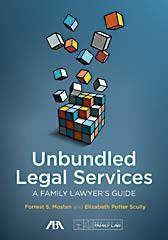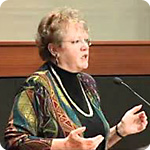 |
Unbundled Legal Services: A Family Lawyer’s Guide
By Forrest S. Mosten and Elizabeth Potter Scully
(2017, Paperback or eBook, ISBN: 978-1-63425-921-7)

Good through August 2025
|
This book’s focus on family law practitioners is particularly appropriate given the unique promise that unbundling holds for family law litigants. In many jurisdictions, self-representation rates are highest in family cases. But, as any family law attorney (or family court litigant) knows, these are the case types that arguably benefit most from attorney involvement. Family issues are among the most sensitive and pressing matters that enter our civil justice system, and the outcomes of these cases can affect entire families for years to come. This important new book provides a crucial step forward in matching individuals with the family law services they need.
 Woody Mosten’s latest contribution to the delivery of legal services, co-authored with Elizabeth Potter Scully, is a “must have” for any lawyers who want to grow their family law practice to include limited scope legal services. Family law is uniquely suited to unbundling and Mosten and Scully have provided a practical and useful step by step guide to a wide range of applications which lend themselves to limited scope services. Their handbook is long on practice pointers and practical suggestions. The material is well organized, easy to follow, and clearly addresses the various applications of limited scope to multiple aspects of family law practice, from document assistance, negotiation coaching, case management, limited scope court appearances and coaching of clients who are mediating their disputes. I highly recommend it as a first step for any lawyer considering adding limited scope legal services to their family law repertoire. The market for limited scope legal services is only going to grow, and smart lawyers are well advised to add this range of services to their family law practice in order to remain competitive.
Woody Mosten’s latest contribution to the delivery of legal services, co-authored with Elizabeth Potter Scully, is a “must have” for any lawyers who want to grow their family law practice to include limited scope legal services. Family law is uniquely suited to unbundling and Mosten and Scully have provided a practical and useful step by step guide to a wide range of applications which lend themselves to limited scope services. Their handbook is long on practice pointers and practical suggestions. The material is well organized, easy to follow, and clearly addresses the various applications of limited scope to multiple aspects of family law practice, from document assistance, negotiation coaching, case management, limited scope court appearances and coaching of clients who are mediating their disputes. I highly recommend it as a first step for any lawyer considering adding limited scope legal services to their family law repertoire. The market for limited scope legal services is only going to grow, and smart lawyers are well advised to add this range of services to their family law practice in order to remain competitive.
Pay particular attention to Chapter 12, which is an overview of the ethical and malpractice minefields of limited scope, and follow the excellent suggestions there carefully. The point of unbundling is to expand your legal practice and increase access to quality legal advice for those who might otherwise be unable to obtain it. While unbundling isn’t as dangerous as its detractors would have you believe, there are ethical and practical considerations which cannot be ignored. The ethical rules regarding unbundling vary widely from state to state. Even states which have adopted the ABA Model Rules sometimes interpret them differently. The authors have addressed this dilemma by focusing on the nuts and bolts of forming, managing, and growing a limited scope family law practice. While the authors have included a table of the relevant rules, be sure to go online and make sure you are complying with the most recent iteration of the rules in your jurisdiction. They change frequently. Actually, there’s a good (and lawyer-friendly) reason for that. As states adopt limited scope, they are often tentative, not sure how it will work, and cautious about protecting the public interest. They tend to start out with stricter rules until they see how it works in their state. As they find it works beautifully when done correctly, they tend to relax the rules to make it easier for lawyers to ethically and safely meet the growing consumer demand.
Mosten and Scully have provided a broad smorgasbord of situations in which unbundling can be incorporated into a family law practice. Unbundled Legal Services is both an introduction to the application of limited scope to a family law practice, and a practical resource and reality check for the experienced family lawyer.
Woody Mosten is a true pioneer in expanding the availability of affordable legal services. He invented unbundling, and this is a worthy next step in his impressive and growing legacy.
M. Sue Talia, Author of
Unbundling Your Divorce: How to Find a Lawyer to Help You Help Yourself
 This extraordinarily comprehensive guide to offering unbundled legal services to the primarily self-represented – who are now a majority of family litigants – offers a uniquely authoritative and practical source for every family lawyer. In the 17 years since he wrote his first ABA book on unbundling, Forrest Mosten has established himself as the creative energy behind the steady growth of unbundled legal services. In this new edition, Mosten and his co-author Elizabeth Potter Scully answer every possible practice question that both naifs and lawyers already accustomed to offering unbundling to clients could ask, including addressing often-voiced misconceptions about malpractice liability and disciplinary issues. In a sign of the unbundling movement’s maturity, Mosten and Scully integrate discussion of client vulnerabilities, disadvantages and sources of mistrust of lawyers and new knowledge about the access to justice crisis among family law clients. Mosten and Scully have written the Unbundling Bible.
This extraordinarily comprehensive guide to offering unbundled legal services to the primarily self-represented – who are now a majority of family litigants – offers a uniquely authoritative and practical source for every family lawyer. In the 17 years since he wrote his first ABA book on unbundling, Forrest Mosten has established himself as the creative energy behind the steady growth of unbundled legal services. In this new edition, Mosten and his co-author Elizabeth Potter Scully answer every possible practice question that both naifs and lawyers already accustomed to offering unbundling to clients could ask, including addressing often-voiced misconceptions about malpractice liability and disciplinary issues. In a sign of the unbundling movement’s maturity, Mosten and Scully integrate discussion of client vulnerabilities, disadvantages and sources of mistrust of lawyers and new knowledge about the access to justice crisis among family law clients. Mosten and Scully have written the Unbundling Bible.
Dr Julie Macfarlane
Distinguished University Professor and Professor of Law
University of Windsor, Ontario, Canada
Author of The New Lawyer and
Director of Canada’s Self-Represented Litigants Project
 This book is a comprehensive guide for lawyers who want to offer unbundled legal services. Doing this is trickier than it sounds and it entails some ethical and malpractice pitfalls, described in chapter 12. So anyone providing these services would be well-advised to get this book.
This book is a comprehensive guide for lawyers who want to offer unbundled legal services. Doing this is trickier than it sounds and it entails some ethical and malpractice pitfalls, described in chapter 12. So anyone providing these services would be well-advised to get this book.
John Lande
Isidor Loeb Professor Emeritus, University of Missouri School of Law
Author of Lawyering with Early Planned Negotiation
Latest & Greatest – Unbundled Legal Services: A Family Lawyer's Guide
January 31, 2018
Using the prevalence and proliferation of self-representation as an impetus, authors Forrest S. Mosten and Elizabeth Potter Scully have embarked upon the advancement of a method of legal representation known as unbundled legal services, or as it also called, limited scope representation in their book, Unbundled Legal Services: A Family Lawyer’s Guide. Broken down into its simplest terms, unbundled legal services refers to the practice of offering various legal services and allowing the client to select the “discrete lawyering tasks” he/she wants the lawyer to perform. The authors have identified seven categories into which these tasks fall and have provided a framework through which such unbundled services can be delivered, thereby allowing a family lawyer with the flexibility to offer full service court representation or become a non-court family lawyer offering limited scope services. Each chapter focuses on the various roles that a family lawyer is typically called upon to assume and explains how such roles can be transformed into one unbundled service. For instance, in many cases, lawyers are, at the same time, dispute resolution managers, negotiators, document drafters, and litigators for their clients. However, according to the authors, each of these roles can be unbundled and offered to the client as separate tasks as opposed to the typical all-or-nothing approach that most full service representation presents. Thus, the client can hire the attorney for those tasks for which he or she might need the most assistance. At the end of most chapters, the authors have provided their readers with practice tips for putting the presented models into play. Also, the authors have set forth the ethical considerations involved with unbundling and possible malpractice “minefields.”
If the idea of the unbundled legal services approach is new to you or if you have not yet considered it as an option for your law practice, come to the Harris County Law Library and have a look at Unbundled Legal Services: A Family Lawyer’s Guide. Who knows? It might be the right plan for you.
Harris County Law Library
Mosten and Scully’s book offers a glimpse of the future and practical guidance for how to get there. As the authors note, “If you choose and can afford to operate your practice without unbundling, you probably will be able to do so for at least the next decade. However, just like many doctors in the 1930s opposed health insurance, today few doctors can practice without seeing patients covered by some form of health plan. It’s in the tea leaves.
Family Court Review, October 2018
One of the most valuable aspects of the book is the clarity with which Mosten and Scully break down the practice of law into separable, discrete functions. Digesting their taxonomy of tasks, roles, and responsibilities, one can begin to cultivate the ability to differentiate and maintain boundaries, a skill critical for the limited scope lawyer. Limited scope practice, or unbundling, has also been referred to as “discrete task representation.” This suggests that both the lawyer and the client must be able to distinguish those tasks and roles and to recognize and respect the limits of the representa- tion. In negotiating the terms of the representation, the lawyer plays a critical role in educating the client about the various services he or she can provide and helping the client determine which tasks will be the client’s responsibility. Both must guard against “scope creep,” but the lawyer has a par- ticular obligation to do so.
It starts innocently, with a call from the unbundled client on a busy afternoon asking a quick procedural or substantive question about an issue the client, not the attorney has agreed to handle. It’s an easy answer, the client is worried and the attorney knows she can quickly alleviate that worry, and it seems uptight, rigid or just too time consuming to explain that providing such information is beyond the lim- ited scope of the attorney’s representation and therefore before she can answer the question they will need an updated retainer agreement. “Just this once,” the attorney goes beyond the agreed upon scope, and the clearly drawn lines of demarcation begin to blur.
Mosten and Scully’s book offers a glimpse of the future and practical guidance for how to get there. As the authors note, “If you choose and can afford to operate your practice without unbundling, you probably will be able to do so for at least the next decade. However, just like many doctors in the 1930s opposed health insurance, today few doctors can practice without seeing patients covered by some form of health plan. It’s in the tea leaves.
Pamela Cardullo Ortiz
Family Court Review, October 2018
Table of Contents
Unbundled Legal Services: A Family Lawyer’s Guide
By Forrest S. Mosten and Elizabeth Potter Scully
Foreword by Hon. Rebecca Kourlis and Natalie Anne Knowlton
Introduction
Acknowledgments
About theAuthors
Prologue: Embracing the Future: Unbundling as an Effective and Profitable
Response to the Pro Se Movement
Chapter 1: Unbundling! What It Is and Why It Works for Clients and Lawyers
What Is Unbundling?
The Full Service Package
The Client Is in Charge
Discrete Lawyering Tasks
Is Unbundling Right for You?
Benefits to Clients
Benefits to Lawyers
Practice Tips
Chapter 2: Unbundling: How It Works
Limited Legal Services
Stage 1: Office Preparation
Stage 2: Clarify Your Approach
Stage 3: Initial Client Intake Conference
Stage 4: Unbundling Assessment
Stage 5: Contracting for Unbundling
Stage 6: Monitoring Limited Services
Stage 7: Converting from Unbundled to Full Service Representation
Stage 8: Evaluation of Client Satisfaction
Practice Tips
Chapter 3: Be a Limited Scope Non-Court Family Lawyer
Learn from the Medical Model
Model 1: Offer Some Limited Scope Services upon Client Request
Model 2: Proactively Offer Limited Scope Options within a Full Service Practice
Model 3: Limited Scope Only Practice (No More Court)
Model 4: Limited Scope Peacemaking Practice
Model 5: Limited Scope Client Education and Advice Only
Model 6: Unbundled Consultant for Other Professionals and Organizations
Practice Tips
Chapter 4: Client Intake and the Initial Client Conference
Agenda for Unbundling Discussion
Initial Conference Topic Checklist
Practice Tips
Endnotes
Chapter 5: Family Lawyer as Limited Scope Dispute Resolution Manager
and Limited Scope Relationship Monitor
Legal and Ethical Trends Supporting Discussion of Options to Litigation Prior to Initiating Litigation
Tasks for the Unbundled Dispute Resolution Manager
Manage the Choice of Options
The Unbundled Consultation for Process Information
Monitoring, Modifying, and Terminating the Limited Scope Relationship
Practice Tips
Endnotes
Chapter 6: Family Lawyer asLimited Scope Drafter of Correspondence, Agreements, and Court Forms
Drafting Correspondence
Drafting Agreements and Non-Court Documents
Drafting Court Forms
Endnotes
Chapter 7: Family Lawyer as Limited Scope Negotiation Coach
Educating Clients about Negotiation Theory
Preparing for a Negotiation
Articulating Specific Proposals
Role Playing and Reality Testing
Practice Tips
Endnotes
Chapter 8: Family Lawyer as Limited Scope Litigation Counsel
How Self-Represented Parties Experience Litigation
Rules Governing Limited Scope Court Appearances
A Friendly Word of Caution
Basic Checklist of Tasks to Allocate in the Litigation Context
Fact Gathering and Legal Research
Organizing by Tasks and Substantive Areas
Additional Litigation-Related Ethical Considerations
Practice Tips
Endnotes
Chapter 9: Limited Scope Representative for Clients Participating in Mediation
Continual Reassessment of Scope of Representation
Outside the Mediation Room
Inside the Mediation Room
Practice Tips
Endnotes
Chapter 10: Family Lawyer asCollaborative Attorney
Collaborative Law as an Unbundled Service
Collaborative Law and Informed Consent
Is Collaborative Law Appropriate for Your Client?
Collaborative Law and Mediation
Anticipating Problems and Preventing Termination
Refusing to Litigate Can Grow Your Practice
Endnotes
Chapter 11: Family Lawyer asLimited Scope Preventive Transactional Attorney and Legal Wellness Diagnostician
Be a Legal Wellness Provider
Look for Hidden Problems
Draft and Promote Preventive Dispute Resolution Provisions
Explore Preventive Relationship Agreements
Administer Legal Wellness Checkups
Educate Clients about Resources
Benefit Your Life as Well as Your LawPractice
Practice Tips
Endnotes
Chapter 12: Ethical and Malpractice Minefields of Unbundling: How to Deliver Limited Scope Services without Being Sued or Disciplined
Widespread Acceptance of Unbundling by the Organized Bar,
Courts, and Legislatures
Identifying and Avoiding Common Unbundling Pitfalls
Avoid Dual Legal Representation in All Situations
Examples from Texas and Massachusetts
Practice Tips
Endnotes
Chapter 13: Setting Up, Managing, and Marketing Your Unbundling Practice
Reception Area
Client Library
Client Education Materials
Point of Sale Information
Office Design
Food and Drink
Staff Training
Practice Tips
Chapter 14: Providing Limited Scope Services for Specific Family Law Issues: Parenting, Support, and Property Division
Child Support: Sample Unbundling Lawyer Tasks
Spousal Support: Sample Unbundling Lawyer Tasks
Restraining Order: Sample Unbundling Lawyer Tasks
Child Custody and Visitation: Sample Unbundling Lawyer Tasks
Division of Property: Sample Unbundling Lawyer Tasks
Pension/Retirement Assets: Sample Unbundling Lawyer Tasks
Other: Sample Unbundling Lawyer Tasks
Practice Tips
Chapter 15: Involuntary Unbundling: Limited Scope Services for Underserved Populations
Involuntary Unbundling
Perspectives on Delivering Unbundled Legal Services to the Poor
How Mutual Biases May Impact Legal Representation
Tips for Breaking Poverty Barriers to Equal Justice
How Racial Disparities May Impact Provision of Unbundled Legal Services
Our Justice System from an Immigrant Perspective
How Mental Health Issues May Impact Provision of Limited Scope Legal Services
Providing Limited Scope Services Remotely
Practice Tips
Endnotes
Chapter 16: Successful Models for Providing Unbundled Legal Services
in Today's Marketplace
Individuals/Small Law Firms That Offer Unbundled Services
Private Firms Offering Stand-Alone Unbundled Services
Nonprofit Organizations Offering Unbundled Services
Court Programs
Bar Association Programs
Conclusion
Endnotes
Chapter 17: Your First Steps toward Offering Unbundled Legal Services
Look to the Future: Your Law Practice in 2040
25 Tips for Starting an Unbundled Peacemaking Practice
or Incorporating Unbundling into Your Current Practice
Find Guidance on Building an Unbundling Practice
Prepare to Unbundle
Develop Unbundling Practice Tools
Launching Your Unbundling Practice
Endnotes
Appendix A: Four Sample Client-Attorney Agreements for Limited Scope Services
Appendix B: Notice of Limited Scope Representation (California)
Appendix C: Notice of Termination of Limited Scope Representation (Wisconsin)
Appendix D: Sample Client Handout (Massachusetts)
Appendix E: Personal Legal Wellness Check-Up and Protocol (California)
Appendix F: Letter from Presiding Judge of Family Law Division Endorsing
Limited Scope Representation (English and Spanish) (Los Angeles County, California)
Appendix G: Sample PowerPoint: Limited Scope Legal Services (Maryland)
Appendix H: Notice Recommending ADR Options (San Mateo County, California)
Index